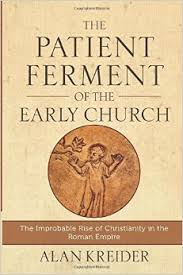|
From the earliest days of the church in the centuries following the death of the apostles, an intentional "training program" (or catechesis) was developed to form and shape believers in the Christian community. Why was this track of catechesis important? Alan Kreider points out a key reason in his The Patient Ferment of the Early Church: The Improbable Rise of Christianity in the Roman Empire: "...believers knew that their practices [i.e., their noticeable, distinctive Christian lifestyles] were not acquired genetically or absorbed from pagan society. As Tertullian puts it around AD 200, 'Christians are made, not born'" (p. 134). Those following Jesus took intentional steps to be transformed by the renewing of their minds (Romans 12:2); they took intentional steps to be made new in the attitude of their minds and to put on the new self (Ephesians 4:22-24); they took intentional steps to make sure they were strengthened and encouraged in their Christian faith (cf. 1 Thessalonians 3:2). A key part of these "intentional steps" was a value placed on catechizing (i.e., intentionally training) those in the Christian faith. It's important to note that a number of different components were included in catechesis. Catechetical practices developed over time in the first few centuries. And no single approach seems to be have been adopted everywhere as the early church grew. We need to acknowledge the numerous layers and the diversity that characterized catechesis. Nevertheless, catechesis was valued. As Kreider points out in The Patient Ferment of the Early Church, by the fourth century we have enough samples of catechetical priorities that we can present a composite picture of what the early church included in their catechetical content. So (more simply), what did the early church teach? Below I've included my own (very minor) adaptations of nine headings Kreider identifies in The Patient Ferment of the Early Church, with brief explanations after each. Any direct quotes are from Kreider's book. 1. Catechesis in the early church was focused on "transforming the habitus."Here Kreider draws on Irenaeus, who "insisted that the church's overarching goal was 'renewing [people from their old habits into the newness of Christ'" (157). The church was not just about filling people's minds with knowledge, but renewing lives in such a way that Christ-like responses become natural, through the cultivation of intentional habits and practices. 2. Catechesis in the early church taught an awareness - and avoidance! - of idolatryThe early church knew that if it was going to foster the worship of the one true God, it also needed to give people a category for idolatry in its many manifestations - so people knew that things compete with our love for God. Here's material from Kreider on this: "...the church's teaching...prepares the catechumens to be alert to idolatry and, at all costs, to renounce it" (157). 3. Catechesis in the early Church emphasized the "master narrative" of the Bible."The catechists knew that people are profoundly formed by the stories they tell; therefore, many catechists made it a priority to present the catechumens the Bible's narrative, which would replace the pagan stories as their primary fund of memory" (157). Sounds like a plug for the Institute class, "Bible Basics: An Important Class about God's Word" to me! :) 4. Catechesis in the early church emphasized the teachings of Jesus.Simply put: "Many catechists saw that instructing the catechumens in the teaching of Jesus was central to their catechesis" (157). 5. Catechesis in the early church encouraged Bible memorization.In the early church, "[t]he vast majority of Christians were illiterate, but Origen knew that they often had astonishing memories, and so Christian teachers used their teaching to fill the people's memories with significant biblical texts..." (158). This is why I champion the discipline of biblical meditation - check out some posts I've written on that here and here. 6. Catechesis in the early church had an important relational component.Specifically, more mature believers mentored younger believers as they tracked through the catechetical process. "The catechumens were conscious that they were apprentices, and they learned to be Christians by watching believers whom they admired" (159). 7. Catechesis in the early church trained believers in "distinctive values."Again, catechesis was not simply about filling minds with content. The larger goal was forming values. (Though content was part of that!) "In early third-century Alexandria, the philosopher Clement saw catechesis as a time when believers are trained in distinctive values" (159). One value that Kreider goes on to emphasize in this section is "a culture of peace." 8. Catechesis in the early church included an active, kinesthetic element."Catechumens learned to be Christians by learning to do habitually what the Christians did, not least with their bodies" (160). Kreider then teases this out by talking about "reflexive actions" and "bodily practices" that helped form them as followers of Jesus. 9. Catechesis in the early church was immensely practical.Training tried to anticipate specific situations believers might find themselves in, and show them what an embodied Christian faith looked like in this very practical, day-to-day situations. Kreider goes on to talk more about the content of catechesis in the early church, but these nine headings give us an important starting point in understanding how the early church thought about forming believers.
0 Comments
Leave a Reply. |
Tim WiebeChristian. Husband. Father. Pastor. Learner. Contributor. Reader. Categories
All
Archives
June 2024
|
© 2014-2024 | 11607 M Circle, Omaha NE, 68137 | www.thebrooksideinstitute.net


 RSS Feed
RSS Feed
